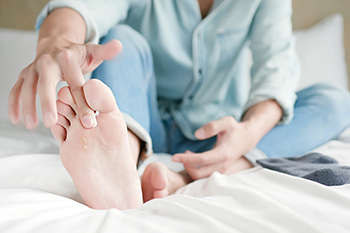6650 Frankford Ave
Philadelphia, PA 19135

Athlete’s Foot is one common and potentially uncomfortable issue that can negatively impact the health of your feet. This condition is essentially a fungal infection that is highly contagious. It is most frequently spread to an individual when they fail to wear shoes in highly-trafficked public areas, such as locker rooms and pool sides. Moisture tends to help this fungal infection thrive and spread quickly. The condition can cause redness, itching, and discomfort. There are several different ways that a podiatrist can go about diagnosing a case of athlete's foot. In some cases, a podiatrist may be able to perform the diagnosis by simply observing the symptoms, such as cracking and discoloration. However, in other cases, a podiatrist may need to perform a skin test to properly diagnose the condition. This is known as a skin lesion potassium hydroxide exam. During such an exam, the podiatrist can take a piece of the infected skin and place it in a chemical called potassium hydroxide. This process ultimately isolates the fungus from the other normal skin cells, allowing the doctor to observe the fungus. If you think that you might have developed a case of athlete’s foot, it may be best to reach out to a podiatrist who can use one of these aforementioned methods of diagnosis.
Athlete’s foot is an inconvenient condition that can be easily reduced with the proper treatment. If you have any concerns about your feet and ankles, contact John M. Fanelly, DPM from Northeast Philadelphia. Our doctor will treat your foot and ankle needs.
Athlete’s Foot: The Sole Story
Athlete's foot, also known as tinea pedis, can be an extremely contagious foot infection. It is commonly contracted in public changing areas and bathrooms, dormitory style living quarters, around locker rooms and public swimming pools, or anywhere your feet often come into contact with other people.
Solutions to Combat Athlete’s Foot
Athlete’s foot can cause many irritating symptoms such as dry and flaking skin, itching, and redness. Some more severe symptoms can include bleeding and cracked skin, intense itching and burning, and even pain when walking. In the worst cases, Athlete’s foot can cause blistering as well. Speak to your podiatrist for a better understanding of the different causes of Athlete’s foot, as well as help in determining which treatment options are best for you.
If you have any questions please feel free to contact our office located in Philadelphia, PA . We offer the newest diagnostic and treatment technologies for all your foot and ankle needs.